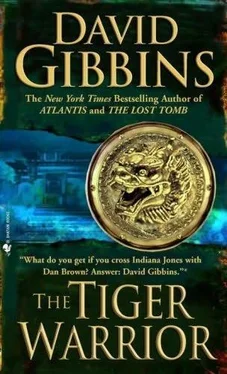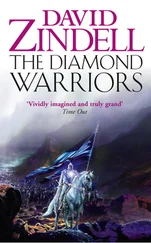David Gibbins - The Tiger warrior
Здесь есть возможность читать онлайн «David Gibbins - The Tiger warrior» весь текст электронной книги совершенно бесплатно (целиком полную версию без сокращений). В некоторых случаях можно слушать аудио, скачать через торрент в формате fb2 и присутствует краткое содержание. Жанр: Прочие приключения, на английском языке. Описание произведения, (предисловие) а так же отзывы посетителей доступны на портале библиотеки ЛибКат.
- Название:The Tiger warrior
- Автор:
- Жанр:
- Год:неизвестен
- ISBN:нет данных
- Рейтинг книги:4 / 5. Голосов: 1
-
Избранное:Добавить в избранное
- Отзывы:
-
Ваша оценка:
- 80
- 1
- 2
- 3
- 4
- 5
The Tiger warrior: краткое содержание, описание и аннотация
Предлагаем к чтению аннотацию, описание, краткое содержание или предисловие (зависит от того, что написал сам автор книги «The Tiger warrior»). Если вы не нашли необходимую информацию о книге — напишите в комментариях, мы постараемся отыскать её.
The Tiger warrior — читать онлайн бесплатно полную книгу (весь текст) целиком
Ниже представлен текст книги, разбитый по страницам. Система сохранения места последней прочитанной страницы, позволяет с удобством читать онлайн бесплатно книгу «The Tiger warrior», без необходимости каждый раз заново искать на чём Вы остановились. Поставьте закладку, и сможете в любой момент перейти на страницу, на которой закончили чтение.
Интервал:
Закладка:
“We’re locked on,” Jack said into the intercom. “Good to go.”
Costas pointed at the horizon. “Engage.”
Jack grinned, pushed the cyclic stick forward to dip the nose again, then flipped on the autopilot. As they gathered speed he glanced at the bridge wing and saw Scott Macalister, a former Canadian coast guard captain who was Seaquest II’s master. Beside him stood a tall, slender girl, her long dark hair blowing in the breeze, shielding her eyes against the glare and waving at them.
“Rebecca seems to be doing nicely,” Costas said.
“For her first expedition, I can’t believe how well she fits in,” Jack replied. “She’s almost running the show. Pretty impressive for a sixteen-year-old.”
“It must be in the blood, Jack.”
They could see the reef now, the dark blue of the abyss rising through shades of turquoise until the coral heads at the top of the slope were visible, some of them nearly breaking the surface. They passed over the wavering yellow forms of two Aquapod submersibles, just about to dive on the ancient ships’ graveyard fifty meters below. Within hours the Aquapods would have completed a full photogrammetric and laser survey of the site, something that would have taken weeks of dives and painstaking hand measurements in Jack’s early days. After surfacing from their dive and returning to Seaquest II he had gone straight into an intensive video conference with the Egyptian Antiquities Authorities, the Egyptian Navy, and the staff of his friend Maurice Hiebermeyer’s Institute of Archaeology in Alexandria. With Seaquest II committed months before to a voyage into the Pacific, another IMU vessel would take over the excavation, and an Egyptian navy frigate would be on station for the duration. The excavation would complete a hat trick of ancient wreck investigations by IMU over the past few years: a Bronze Age Minoan shipwreck in the Aegean, St. Paul’s shipwreck off Sicily and now this. Jack fervently hoped he would be back in time to work on the site himself, but for now he was thrilled to have set the wheels in motion. He relaxed back in his seat, breathing out the excess nitrogen in his bloodstream and feeling his body recoup its strength after the dive. He was exhausted, but elated. He was itching to reach their destination, to discover what Hiebermeyer had been badgering him to see for months now in his excavation in the Egyptian desert.
“Check out that island.” Costas gestured at a barren, rugged outcrop in the sea below them, about two kilometers across and rising to a peak several hundred meters high, the rock scorched white and seemingly devoid of vegetation. It looked like a place of extremes, unable to support life.
“That’s Zabargad, known as St. John’s Island,” Jack said. “The ancient Greeks called it Topazios, the Island of Topaz.”
“I can see rock tailings, old mine workings, around the edge of the mountain,” Costas said.
“It was the only ancient source of peridot, the translucent green gem also called olivine,” Jack said. “The island’s a minerologist’s dream, an upthrusting of the earth’s crust. The Chinese revered peridot because it’s like jade, a sacred stone. They thought it had healing qualities. The best gems were the treasures of emperors.”
“Was it mined by convicts?” Costas asked.
“You’ve got it. The mother of all penal colonies,” Jack said. “To most of the prisoners here, this was the end of the earth.”
Costas took a deep breath. “It reminds me of Alcatraz.”
“A longer swim here than San Francisco Bay, and a few more sharks.”
“Did anyone ever escape?”
“Before I try to answer that, look at this.” Jack reached into his front pocket and took out a small envelope. He passed it to Costas, who tipped out the object inside onto his palm. It was the gold coin Jack had picked up on the seabed, glistening and perfect, as if it had come straight from the mint.
“Jack…”
“I borrowed it. A sample. I had to have something to show Maurice. Ever since we were schoolboys he’s been telling me that nothing equals the treasure from Egyptian tombs.”
“Dr. Jack Howard, the world’s premier maritime archaeologist, loots his own site. What will the Egyptian authorities say when I tell them?”
“The authorities? You mean Herr Professor Dr. Maurice Hiebermeyer, the greatest living Egyptologist? He’ll probably give me a pitying look and show me a jewel-encrusted mummy.”
“I thought you guys only liked bits of broken pot.” Costas grinned, and held the coin up carefully between two fingers. “Okay, so why show me this now?”
“The portrait on the obverse is Augustus, the first Roman emperor. Now check out the reverse.”
Costas turned the coin over. Jack saw a shield in the middle, a standard on either side. The standard on the right was topped by an orb, signifying Rome’s domination over the world. The one on the left had an aquila, the sacred eagle that legionaries would fight to the death to protect. They were the signa militaria, the Roman legionary standards. Jack pointed to the inscription in the middle. “Right. Now read out the words.”
Costas squinted. “Signis Receptis.”
“That means ‘Standards returned.’ This coin was one of Augustus’ prized issues, about 19 BC, only a few years after he became emperor. Augustus was consolidating the empire, following decades of civil war. His son Tiberius had just concluded a peace treaty with the Parthians, who ruled the area of Iran and Iraq. They agreed to return the standards that had been taken from defeated Roman legions years before. Augustus treated the return as a personal triumph, and had them paraded through Rome. It was a huge propaganda score for him, though too late to help the men who had fought under those standards and been unlucky enough not to die on the battlefield.”
“What does this have to do with convicts?”
“Backtrack to 53 BC. Rome is still a republic, ruled by the triumvirate of Julius Caesar, Pompey and Crassus. Already things are falling apart, with personal rivalries and ambitions that would lead to civil war. Military prestige is what matters. Pompey has his, having cleared the sea of pirates. Julius Caesar is getting his, campaigning in Gaul. Crassus is the odd one out. He decides to seek glory in the east, and to hunt for gold. The difference was Pompey and Caesar were both seasoned generals. Crassus was a banker.”
“I think I can guess what happened.”
“The Battle of Carrhae, near modern Harran in southern Turkey. One of the worst defeats ever suffered by a Roman army. Crassus was a useless general, but his legions fought for Rome, and for their own honor. They fought hard, but were overwhelmed by the Parthian cavalry. At least twenty thousand were slaughtered, and the wounded were all executed. Crassus was killed, but a Roman soldier was dressed up as him and forced to drink molten gold.”
“Fitting end for a banker.”
“At least ten thousand Roman soldiers were captured. Those who weren’t executed were sent to the Parthian citadel of Merv, and probably used as slave labor building the city walls. That’s the connection. Mines, quarries, slave labor. The lot of prisoners of war in antiquity. Merv wasn’t cut off by sea like St. John’s Island, but was marooned in the desert wastes of what’s now Turkmenistan. At that time hardly anyone knew what lay beyond the lands conquered by Alexander the Great in the fourth century BC, beyond the Indus and Afghanistan.” Jack flipped open the computer screen between the two seats, and clicked the mouse until an image came up. It showed a scorched landscape of ruins and dusty tracks surrounded by a vast, decayed rampart, flattened in places to a rounded hillock. “That’s what’s left of Merv,” he said. “Those are the walls of ancient Margiana, the name of the city at the time of the Parthians.”
Читать дальшеИнтервал:
Закладка:
Похожие книги на «The Tiger warrior»
Представляем Вашему вниманию похожие книги на «The Tiger warrior» списком для выбора. Мы отобрали схожую по названию и смыслу литературу в надежде предоставить читателям больше вариантов отыскать новые, интересные, ещё непрочитанные произведения.
Обсуждение, отзывы о книге «The Tiger warrior» и просто собственные мнения читателей. Оставьте ваши комментарии, напишите, что Вы думаете о произведении, его смысле или главных героях. Укажите что конкретно понравилось, а что нет, и почему Вы так считаете.












